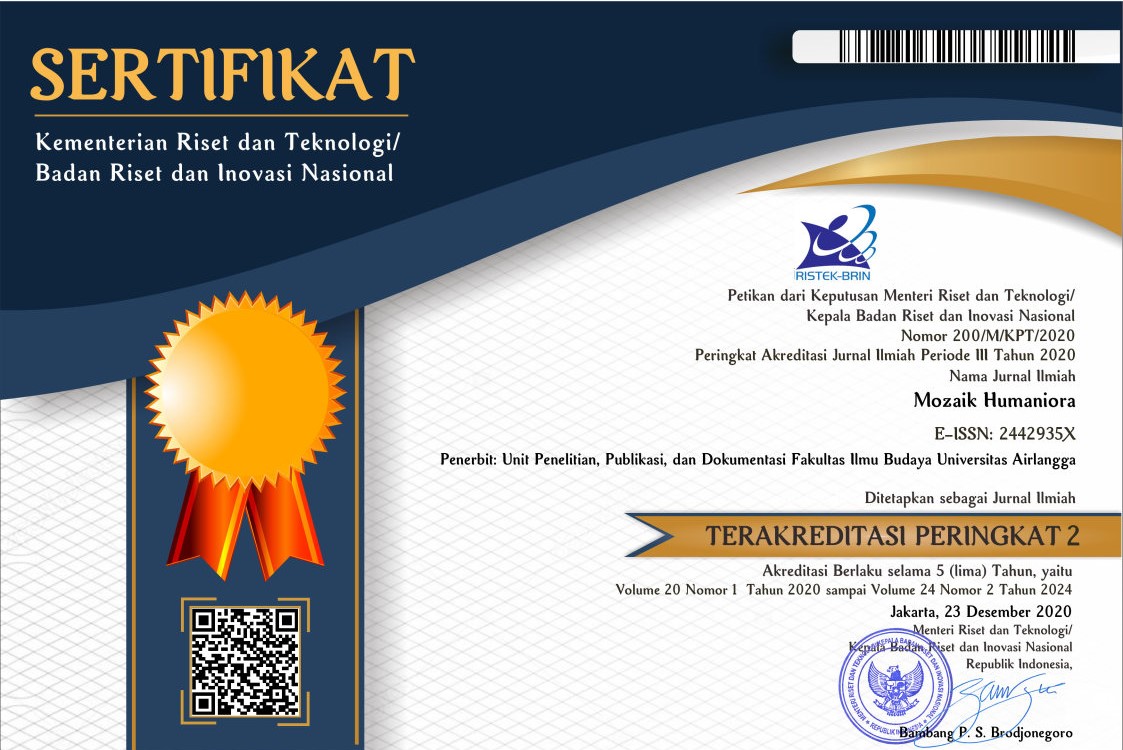“Call Me Judy”: Cross-Cultural Interaction in Asian-American Environment
Downloads
This study scrutinizes the cross-cultural interactions in the 2019 Asian-American movie Always Be My Maybe. A notable linguistic feature that diverges across cultures is the honorific system, which varies significantly between Asian and Western contexts. This research analyzes the honorifics employed in the movie using a qualitative approach, grounded in Brown and Levinson’s politeness theory. The findings reveal that, despite the Asian-American setting, the Korean main characters often use the Korean honorific system to address elders, highlighting cultural retention. Additionally, the study underscores that acculturation occurs naturally for individuals living in different cultural environments over time. However, it emphasizes that individuals do not entirely abandon their original culture nor fully adopt the new one. This dynamic is illustrated through the characters’ interactions, where they navigate between Korean and Western addressing systems based on context and relationships. The use of honorifics and politeness strategies plays a crucial role in avoiding misunderstandings and maintaining harmony. Another finding from this study, which is related to the first, shows that acculturation is inevitably encountered by someone who has been living in a different culture for a period of time. This study serves as a case analysis representing the interplay of honorific systems from two cultures, providing insights into sociopragmatic behaviors in cross-cultural settings.
Brown, Michael F. 2008. “Cultural Relativism 2.0.” Current Anthropology 49 (3), 363—73. DOI: 10.1086/529261.
Chen, Guo-Ming. 2006. “Asian Communication Studies: What and Where to Now.” Review of Communication 6 (4), 295—311. DOI: 10.1080/15358590601014596.
Cook, Haruko Minegishi. 2011. “Are Honorifics Polite? Uses of Referent Honorifics in a Japanese Committee Meeting.” Journal of Pragmatics 43 (15), 3655—3672. DOI: 10.1016/j.pragma.2011.08.008.
Effendi, Palupi Paramarta. 2021. “Crazy Polite Asians: Politeness Strategy And Cultural Relativism in Asian-Western Environment.” Language Horizon: Journal of Language Studies 9 (1), 70—80. DOI: 10.26740/lh.v9n1.p70-80.
Ide, Sachiko. 1993. “The Search for Integrated Universals of Linguistic Politeness.” Multilingua 12 (1), 7—11.
Jaeger, Sara. 2019. “Linguistic Politeness in Children’s Movies: A Quantitative Corpus Study of Politeness Expressions in The Movie Corpus.” Bachelor Thesis. Vaxjo: Linnaeus University.
Kecskes, Itsvan. 2017. “Cross Cultural and Intercultural Pragmatics by Istvan Kecskes.” In The Oxford Handbook of Pragmatics, edited by Yan Huang. Oxford: Oxford University Press.
Kerkam, Zainab Mohamed. 2015. “A Comparison of Arabic and English Directness and Indirectness: Cross-Cultural Politeness.” Doctoral Thesis. Sheffield: Sheffield Hallam University.
Kiyama, Sachiko, Katsuo Tamaoka, & Masato Takiura. 2012. “Applicability of Brown and Levinson’s Politeness Theory to a Non-Western Culture: Evidence from Japanese Facework Behaviors.” SAGE Open 2 (4), 1—15. DOI: 10.1177/2158244012470116.
Lambert, Vickie A, & Clinton E. Lambert. 2012. “Qualitative Descriptive Research: An Acceptable Design.” Pacific Rim International Journal of Nursing Research 16 (4), 255—256.
Marti, Leyla. 2006. “Indirectness and Politeness in Turkish-German Bilingual and Turkish Monolingual Requests.” Journal of Pragmatics 38 (11), 1836—1869. DOI: 10.1016/j.pragma.2005.05.009.
McGee, Peter. 2019. “Cross-Cultural Pragmatic Failure.” Training, Language and Culture 3 (1), 73—84. DOI: 10.29366/2019tlc.3.1.5.
Moon, Chanki, Ayse K. Uskul, & Mario Weick. 2019. “Cultural Differences in Politeness as a Function of Status Relations: Comparing South Korean and British Communicators.” Journal of Theoretical Social Psychology 3 (3), 137—45. DOI: 10.1002/jts5.40.
Ogiermann, E. 2009. “Politeness and In-Directness Across Cultures: A Comparison of English, German, Polish and Russian Requests.” Journal of Politeness Research 5 (2), 189—216. DOI: 10.1515/JPLR.2009.011.
Okamoto, Shigeko. 2011. “The Use and Interpretation of Addressee Honorifics and Plain Forms in Japanese: Diversity, Multiplicity, and Ambiguity.” Journal of Pragmatics 43 (15), 3673–3688. DOI: 10.1016/j.pragma.2011.06.012.
Paltridge, Brian. 2012. Discourse Analysis: An Introduction. London: Bloomsbury Publishing.
Ren, Dongjie & Zhengbing Liu. 2019. “Chinese People’s Pragmatic Failure in English in Cross-Cultural Communication.” In International Conference on Literature, Art and Human Developmeny. UK: Francis Academic Press. DOI: 10.25236/iclahd.2019.063.
Song, Sooho. 2012. Politeness and Culture in Second Language Acquisition. Palgrave Macmillan.
________. 2017. “The Brown and Levinson Theory Revisited: A Statistical Analysis.” Language Sciences 62, 66—75. DOI: 10.1016/j.langsci.2017.03.006.
________. 2022. “Analysis of Gender Pronoun Errors in Korean Speakers’ English Speech.” English Teaching (South Korea) 77 (1), 21—39. DOI: 10.15858/ENGTEA.77.1.202203.21.
Stukan, Diana. 2018. “Sociopragmatic Failure: Struggling with Cross-Cultural Differences in Communication.” Open Journal for Anthropological Studies 2 (1) DOI: 10.32591/coas.ojas.0201.03027s.
Thomas, Jenny. 1983. ‘Cross-Cultural Pragmatic Failure’. Applied Linguistics 4 (2), 91—112. DOI: 10.1093/applin/4.2.91.
Tilley, John J. 2017. “Cultural Relativism.” In The Blackwell Encyclopedia of Sociology. John Wiley & Sons, Ltd. DOI: 10.1002/9781405165518.
Zhang, Shu 2019. ‘Differences of Polite Language between Chinese and English from the Viewpoint of Face’. Advances in Social Science, Education and Humanities Research 294.
Copyright (c) 2024 Palupi Paramarta Effendi

This work is licensed under a Creative Commons Attribution-ShareAlike 4.0 International License.

Mozaik Humaniora is licensed under a Creative Commons Attribution-ShareAlike 4.0 International License. Both authors and Mozaik Humaniora agree with the following attribution of journal:
1. Copyright of this journal is possession of Author, by the knowledge of the Editorial Board and Journal Manager, while the moral right of the publication belongs to the author.
2. The journal allows the author(s) to retain publishing rights without restrictions
3. The legal formal aspect of journal publication accessibility refers to Creative Commons Attribution Share-Alike (CC BY-SA).
4. The Creative Commons Attribution Share-Alike (CC BY-SA) license allows re-distribution and re-use of a licensed work on the conditions that the creator is appropriately credited and that any derivative work is made available under "the same, similar or a compatible license”. Other than the conditions mentioned above, the editorial board is not responsible for copyright violation.


















